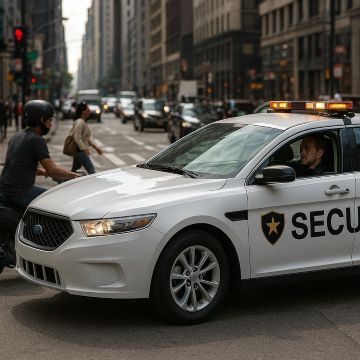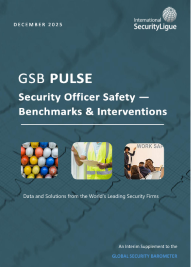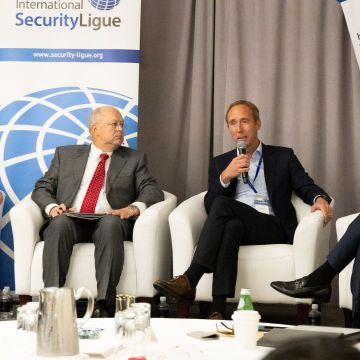
A 2025 research study offers a clear message: when private security and police work in alignment, cities are safer, more resilient, and better equipped to manage the realities of life after dark.
Read More
The International Security Ligue joined global leaders in Geneva to push for stronger, cross‑sector cooperation on the emerging cyber and physical risks posed by agentic AI.
Read More
Geopolitics is reshaping the operating environment faster than most companies can adapt—and the rise of the Chief Geopolitical Officer underscores how high the stakes have become. But while private‑sector security intelligence is now essential to strategic decision‑making, its growing importance outpaces its professional maturity.
Read More
Understanding how business executives think about corporate security lays the groundwork for shaping their opinion.
Read More
Near-miss events are upstream indicators of potential safety problems, as research shows that workers who experience a near miss are 2.5 times more likely to be injured. However, underreporting within near-miss data collection efforts threatens to distort the insights that firms can use to prevent harm.
Read More
For security firms that conduct extensive vehicle patrols on behalf of clients, the stakes are extremely high. Here is what safety leaders at top firms say they are doing to make the road safer for officers.
Read More
Safety data on 1 million-plus frontline security professionals show injury rates rising across most regions, prompting the International Security Ligue to call for renewed industry-wide commitment to protect these essential workers. The inaugural GSB Pulse pairs benchmarks with field-tested interventions and expert perspectives to help firms meet today's safety challenges.
Read More
Total Defence reframes national security as a continuous, whole‑of‑society effort—aligning government, businesses, NGOs, and citizens so essential services keep running through war, crisis, or hybrid attacks. By integrating private security, interoperable standards, and joint planning, it boosts surge capacity, protects critical infrastructure, and shortens recovery and recovery times.
Read More
A big-box chain plagued by nightly break-ins found a nimble, cost‑effective fix — and overnight thefts dropped to zero.
Read More
In a recent IACA webinar, the Ligue’s Tanja Kulisch-Ziemens urged policymakers and other stakeholders to treat cash not as a fading commodity but as a strategic public good—modernized, resilient, and deserving of clear regulatory stewardship to preserve choice, inclusion, and monetary sovereignty.
Read More
Part II of our deep dive into data finds compelling proof that greater investment in trained, well‑deployed private security—paired with surveillance and controls—pays dividends by cutting theft, embezzlement, claims and premiums.
Read More
Private security now outnumbers police in many places, which has not gone unnoticed by insurers, courts, and businesses. New Ligue analysis shows that higher density of properly trained personnel, when integrated with technology, correlates with fewer insurance claims, reduced legal exposure, and measurable cost savings for enterprises.
Read More
The Ligue Cash Chapter organized a workshop in the European Parliament focused on how to reinforce the role of Cash as a key driver for trust, security, and resilience in times of uncertainty.
Read More
Perhaps, in a utopian world, cash would be less relevant. In the world we live in, however, physical currency is critical—and the ability to turn to cash in a crisis requires upkeep. New research shows just how much people rely on cash in turbulent times.
Read More
Committed to remaining upstream of emerging risks and other issues impacting the security industry, top executives at the world’s leading security firms gathered in New York in September for the Ligue’s Leadership Forum. This is a summary of two of the sessions at the event.
Read More
The International Security Ligue’s inaugural Cash Chapter Leadership Forum convened CEO‑level executives, regulators, and experts to turn coordinated advocacy into measurable progress and to set a strategic agenda for cash’s role in a digital era.
Read More
At its biennial General Assembly and Leadership Forum in New York City, the International Security Ligue announced a $25,000 donation to New York Cares, reinforcing its commitment to community resilience and social impact.
Read More
Honored with the Jørgen-Philipp Sørensen Award at the International Security Ligue’s 39th General Assembly, Darrian Hardy’s story is a powerful reminder of the quiet courage and leadership security professionals bring to our communities every day.
Read More
Building on the momentum of the landmark Global Security Barometer, the International Security Ligue is launching GSB Pulse—a data-driven series spotlighting overlooked security topics and actionable insights, which will kick off this winter with a groundbreaking deep dive into 30,000 public security contracts.
Read More
Criminal networks are now outsourcing violence on demand—recruiting youths to extort, swat, and terrorize businesses worldwide—exposing a new frontier of risk that demands urgent, cross-border defenses.
Read More
Valuable tips, a few words of warning, and some simple actions that security leaders say made a world of difference for their security operations.
Read More
As Brussels advances the Single Currency and Payment Services Packages, the International Security Ligue Cash Chapter urges a holistic framework to guarantee mandatory cash acceptance, robust distribution networks, and rigorous enforcement. New position papers underscore cash’s vital role in underpinning freedom, resilience and national security in an increasingly uncertain world.
Read More
The International Security Ligue coalesced advice from a focus group of Chief Security Officers and leading industry voices on how to combat common management obstacles, resulting in tips for getting company management to recognize the positive return on security investments and for approaching 9 other fierce management challenges.
Read More
The International Security Ligue’s latest infographics call out the global race to the bottom fueled by price-focused security contracts, exposing how undervaluing security contributes to wage gaps, turnover, and serious public safety risks.
Read More
Strong security and property protection not only shields profits but also drives investor confidence and stock-price gains, according to academic research.
Read More
Europe’s security sector is at a crossroads: plagued by talent shortages and regulatory drag, it's also a leader in risk awareness. The challenge now is turning that awareness into action—by investing in people, unlocking innovation, and reframing security as a business driver, not just a cost.
Read More
When mass violence looms, the most powerful deterrent isn’t AI cameras or gunshot sensors—it’s armed eyes and ears on the ground.
Read More
Fully unlocking AI’s transformative potential requires driving innovation while also building and maintaining public trust.
Read More
People have a right to use public transportation without fear and anxiety, which requires city officials and public transportation operators to confront this question: How can we prevent unwanted sexual behaviors in public transit?
Read More
Experts reveal how dynamic partnerships between public police and private security hold the key to revolutionizing crime-fighting and safeguarding our urban landscapes.
Read More
Violence in hospital settings is growing and at risk of becoming normalized according to a global survey. What do the people who work in healthcare facilities say is most needed to turn things around?
Read More
Caught in a bureaucratic quagmire, some qualified security professionals are stuck in licensing limbo—leaving businesses exposed and communities at risk until red tape is finally cut.
Read More
Rick Kaufman, a leading voice in emergency management and behavioral threat assessment, will deliver a keynote at Behavioural Analysis 2025, sharing insights from his decades-long experience—including his role in the Columbine response—highlighting the critical need for human-centric security strategies.
Read More
Global Security Barometer 2025 exposes stark regional security gaps and calls on industry and governments to unite for a more robust, collective defense.
Read More
Every second matters in an active shooter incident, and preparedness gaps can mean lives. Learn the critical mistakes organizations make and how to fix them.
Read More
In addition to identifying 'bad actors', a company's security effort should aim to prevent incidents by tackling the root cause of many of them: organizational issues that give rise to unwanted security behaviors.
Read More
After studying the growing push for ‘cashless’ or ‘cash-lite' economies, the Organization for Economic Cooperation and Development has found evidence of significant risks for consumers.
Read More
Just released, a sweeping study by the Ligue warns that businesses—and even critical infrastructure—are dangerously unprepared against today’s complex threats and urgently calls for enhanced collaboration to stave off emerging risks and bolster resilience worldwide.
Read More
In addition to ensuring the availability of boots on the ground, strategic integration between security operations and business continuity is vital. Here are 8 suggestions for getting the two functions to work better together.
Read More
Security officers represent tens of millions of eyes and ears in society, making them a valuable tool in the global fight against human trafficking.
Read More
In its submission to the EU Commission, the Ligue expressed its concern that the current criteria for public contracts are placing people, businesses, and critical infrastructure at risk.
Read More
New data on injuries covering 2022 and 2023 show injury rates for frontline security workers ticking upwards, strongly underscoring the need for sustained attention and investment in employee safety in the security services industry.
Read More
The Global Security Barometer is a comprehensive exploration of the state of global security and critical challenges facing the security services industry, blending survey results with unique perspectives from more than one dozen subject matter experts.
Read More
Tanja Kulisch-Ziemens, Secretary General of the Ligue’s Cash Chapter, was on hand at the Bundesbank's Cash Symposium on Feb. 5 in Berlin to supply a recap.
Read More
Sweden became the latest country to engage in handwringing over how to mitigate random gun violence in public or quasi-public places after 10 people were shot dead last week at an adult school in Orebro. There are numerous reasons why such violence is hard to prevent, but does focusing on win-win strategies offer a path to protection?
Read More
A hospital leveraged its security firm's AI-driven patrol technology to dramatically reduce security incidents and empower officers to focus on critical areas like the emergency department and for deterring violence in psychiatric care units.
Read More
Strengthening perimeter protection can increase the amount of time between detection of an intrusion and the point at which an attack would be successful, which layers of security help to facilitate. But how far out should you go?
Read More
Despite the rise of digital payments, cash remains a resilient and preferred choice, defying predictions of its demise.
Read More
New data show people worldwide think crime and violence is increasing in their neighborhood, which can shake the foundations of social cohesion and the stability of societies. It begs the question: what would make people feel safer?
Read More
Although the motives of perpetrators in recent vehicle ramming attacks appear to be diametrically opposed, they followed the same simple attack plan: drive a vehicle at high speed into a crowd of people.
Read More
From "one-horse races" to contracts going to firms with ties to organized crime, recent investigations reveal the need for better public procurement in contracts for security services.
Read More
We need a cautious and holistic approach in forthcoming legislations to ensure an effective level playing field for both digital and physical central bank currencies.
Read More
The Ligue has been busy fielding reporters’ questions following the targeted killing of a CEO of a major healthcare company outside a Midtown Manhattan hotel. One question we’re getting is if other companies should be worried about copycat attacks.
Read More
An organization may have an ‘executive protection plan’ in place, but time and technology can create new vulnerabilities. What is needed is a security process and partners that make an organization capable of adjusting to changing risks.
Read More
A look at 8 studies reflects a range of benefits from private security services, including improving the image of police, greater public sense of security, and crime reduction.
Read More
The International Security Ligue—as the industry's global representative—is working to catalyze coordination among stakeholders. Director General Stefan Huber participates in a Q&A to discuss this aspect of the Ligue's work.
Read More
A global contest for private security professionals attracted entries from Singapore to Sweden, uncovering a diverse set of reasons for why people work in the industry.
Read More
Stagnant interchange fees threaten the critical mission to ensure that cash remains widely available, accessible and accepted as a means of payment.
Read More
Until a negative incident occurs, it is tempting for a business to assume their protective shield is as strong as ever. But security systems on "autopilot" are actually in a state of decay.
Read More
The Ligue is proud to have contributed to an important new white paper from CoESS on Public-Private Partnerships, a great resource for understanding the potential of these arrangements to drive better security and improve the resilience of societies.
Read More
Stores, restaurants, and hotels in the EU prefer cash for its security, reliability, and privacy, yet more of them aren't accepting cash, according to European Central Bank survey results released in September.
Read More
Integrated security solutions, combining human expertise with technology, not only enhance security operations but also yield significant (and surprising) business value.
Read More
Making society resilient against manmade and natural disasters is not the only reason why cash acceptance is critical; "cashless" retailers also do disservice to the public.
Read More
Intelligence tradecraft in the private sector has expanded significantly. Done right, it supports strategic decision-making related to risk and security, as well as strategic opportunity, and positions organizations ahead of events.
Read More
While there are countless benefits to contracting security, there is an oft-cited drawback: loss of control. However, as the following case study shows, for companies that want to retain it, control and outsourcing need not be mutually exclusive.
Read More
Since digital payments and cash have similar environmental impacts, supporting one or the other is an unwise strategy to make payment systems more environmentally friendly. Indeed, tilting in one direction or the other can create an infrastructure imbalance that makes things worse.
Read More
Dozens of countries still impose on restrictions on foreign ownership of private security companies, a position that they may wish to re-think for reasons of security, economic development, professionalization, technological innovation, and consumer choice.
Read More
The need to ensure that cash is maintained as a viable payment method is being advocated by civil society organizations, ordinary citizens, and—increasingly—by legislative bodies.
Read More
When crafting innovative approaches to social challenges from urbanization, public officials should consider research that proves private security is an effective supplement to public police, including for deterring crime, helping individuals in need, and controlling disorder.
Read More
A company’s spending on security may not directly generate company profits, but that doesn’t mean it can’t benefit a company’s share price or boosts its revenue.
Read More
Evidenced by communication failures that nearly ended in Trump’s assassination, joint security arrangements require specific attention to coordinating activities, including development of a common vision, process standardization, joint training initiatives, and internal and external communication.
Read More
The importance of maintaining and supporting the cash infrastructure has never seemed more important than in the wake of this week's catastrophic IT outage.
Read More
Regarding the attempted assassination of former US President Trump, it is easy to think—if a specific individual or group of people had needed to sign-off on a specific decision to leave that rooftop unprotected—that a different decision would have been made.
Read More
What if we turned to security workers for help and found they weren’t there?
Read More
Strict reliance on digital payments can make societies less resilient, highlighted by recent outages in March that forced some businesses to close shop and hit McDonald's and Tesco, among others.
Read More
Crowds possess enormous destructive power as trampling tragedies prove, so major events or gatherings demand well-trained security personnel and adequate planning that includes studying pedestrian traffic flows and circulation routes.
Read More
In pursuit of its mission to forge practical and equitable security standards, the Ligue now has a place on an ISO technical committee that works on various projects related to security and resilience.
Read More
A decision not to implement recommended security measures should be part of a thoughtful process, one that is equally robust as approving security projects or expenditures.
Read More
European Consumer Protection Ministers, as well as those in Germany, recently highlighted the need to safeguard access to cash to protect consumers and ensure a resilient retail payment system.
Read More
The Ligue’s review of Government Transparency Institute data suggests that public tendering for guard services must substantially improve, as practices in those tenders are worse than in tenders for comparable services.
Read More
Financial analysts say they are encouraged by what they see regarding business opportunities and financial activity in the physical security industry. This article examines financial activity in the security industry and highlights key trends to look for moving forward. (This article was originally published in 2023 and has been updated.)
Read More
The International Security Ligue was represented at the State of Security Conference at the Brandenburg Gate in Berlin, a high-profile and important industry event.
Read More
The world’s critical infrastructure is a greater target and more vulnerable than ever, facts that demand a comprehensive approach to protection that aligns physical and cybersecurity and requires collaboration on many fronts. This Q&A primer outlines issues involved and provides entry-level context to a pressing global security challenge.
Read More
It's slowly changing, but security is a male-dominated profession. Women already in the profession believe certain initiatives—which are not universal—could encourage more women to enter and remain in security.
Read More
Utilizing the expertise of a contract security firm is tempting, but the transition can be off-putting. Here are 6 steps that a major healthcare group took that it says helped them to successfully make the change.
Read More
The International Security Ligue (Ligue) has appointed Tanja Kulisch-Ziemens as of May 2024 as its new Secretary General for the Cash Chapter of the Ligue—a position that has recently been created to address the current disruptive challenges of the industry.
Read More
A stubborn and increasing source of turnover—somewhat “hidden” from the industry—results from new security hires who never report for work or resign before Day 60.
Read More
A little more than 100 days into his tenure as the first Director General of the International Security Ligue, we caught up with Stefan Huber to learn where he sees the Ligue focusing its efforts in the months ahead.
Read More
A global pharmaceutical company’s security executive used a novel approach to better understand how much value a new access credentialing system was creating for his company.
Read More
If adopted, Costa Rica will attract foreign investment, improve quality of security services in its country, and enhance national security.
Read More
Security officer quality takes center stage at the most critical of times, from disruptions at shareholder meetings to campus protests. Managed correctly, such events may be quickly forgotten. Handled poorly, and they can gain media attention and do lingering damage to an organization’s reputation.
Read More
A 40-year-old man went on a stabbing rampage April 13 at a crowded shopping mall in the suburbs of Sydney, Australia, underscoring the challenge of predicting and preventing random attacks in spaces open to the public. What can “soft targets” do?
Read More
Global contest encourages security workers to share what they like about their job.
Read More
From Melbourne to Hyderabad, citizens are voicing objections to curtailing the freedom to pay in cash
Read More
Legislators in Los Angeles (USA) are re-writing current city codes with the goal of improving public safety while simultaneously freeing up police to focus on important crime issues.
Read More
A new study on the scope and breadth of the global physical security sector indicates the industry is vibrant market, has regional variations, and includes a few surprises.
Read More
Company security leaders—as a group—do an insufficient job promoting the value of their function, according to research. Security’s full range of benefits are still largely unrecognized. What should security leaders do to change that?
Read More
Evolving international issues are impacting the security of supply lines, requiring organizations to integrate security throughout supply chain activities. But which solutions yield business value beyond protection?
Read More
Some service providers count on consumers to skip due diligence when contracting for services, which results in lower quality work and more consumer complaints. Here is how that plays out in the security sector and what organizations should do to be more informed security consumers.
Read More
All the old reasons for employee deviance still exist today. But there are new reasons for it, too, including less loyalty being exchanged between workers and their employers, a growing mindset of entitlement among younger workers, and greater opportunities to profit from dishonesty.
Read More